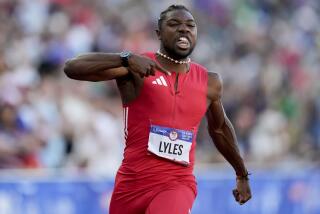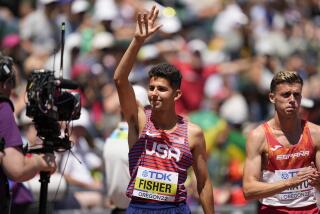HOUSTON McTEAR : His Sprint Career Ended Nearly as Fast as One of His Races; Now He’s Coming Back
- Share via
Glory days, well, they’ll pass you by. Glory days, in the wink of a young girl’s eye. --BRUCE SPRINGSTEEN (ASCAP), 1984 Sprinter Houston McTear was riding the bus to practice at UCLA from his apartment in West Los Angeles the other day when a man sat down next to him.
“Say, didn’t you used to be the world’s fastest human?” the man asked.
The man had a good memory. Many people have long since forgotten about Houston McTear, the one-time schoolboy sprint flash from Florida. Still, there is always someone who remembers.
“It happens all the time,” McTear said. “People still remember Mac. I was the world’s fastest human. I did it once and I can do it again.”
McTear became an overnight sprint sensation when he tied Ivory Crockett’s world record in the 100-yard dash 10 years ago last month in a high school track meet.
He has been down and out, but he still dreams of beating Carl Lewis.
McTear, 28, self-destructed nearly as fast as boxer Leon Spinks. That’s why he’s riding RTD buses these days, instead of driving a Rolls-Royce.
He was unable to capitalize on the once-in-a-lifetime breaks that came his way because of his amazing speed.
He has had problems with lack of coaching, money, swindlers, drugs and just being able to cope. He has failed at several comeback attempts. Many who figured him for a world-class star have forgotten, or simply given up on him.
And now, McTear is attempting what may be his final comeback.
“I still believe in the young man,” said John Smith, a former Olympic quarter-miler who has made a reclamation project out of McTear. Smith has invested time, money and patience in McTear.
Smith is an actor who is also an assistant track coach at UCLA. He has known McTear since McTear came to Los Angeles. Smith says that all McTear needs is discipline and good coaching.
Making something big of McTear’s athletic career is a longshot, though, at best. McTear will be 32 when the 1988 Olympics are held. And his is not a young body. It is a body that was frequently injured, then abused by, among other things, a cocaine habit that cost $200-$300 a week.
Once he had shown the world his speed, things came quickly for McTear. He lost them even more quickly. He was fast, but he also was poor, immature and naive. He also had a third-grade reading level.
McTear was the second-oldest of nine children. His family lived in a shack on a sandy road in the backwoods of the Florida panhandle. His father worked in a sawmill in Baker, Fla. McTear’s family was clearly losing the war against poverty.
Muhammad Ali read about McTear’s speed and the family’s plight, and bought the McTear family a four-bedroom house.
“McTear’s a special people,” Ali said at the time. “I can recognize special people because I’m special. It’s not easy to run fast. What did he run the 100-yard dash in? Nine seconds flat. Well, that makes him the fastest man in the history of the world.”
Later, McTear ran for the Ali Track Club until promoter Harold Ross Fields Smith was jailed for his part in a million-dollar scam involving the club. McTear claims that he still talks to Ali.
It was all so sweet in those early days. McTear ran into instant celebrity as an 18-year-old Florida schoolboy on May 9, 1975, with his 9-second clocking in the 100-yard dash at the Florida state high school track meet.
“That 9-flat could have been the greatest thing that ever happened to him,” Will Willoughby, McTear’s high school track coach said in a recent story in the Orlando, Fla., Sentinel. “But unfortunately, it didn’t turn out that way. It’s a sad story. I had coached him all I could, but I knew he needed someone more advanced. I’m not sure he ever got it from anyone though, and I’m not even sure who’s to blame.”
The Times story on the race the following day quoted Bill Buchalter, who had covered the race for the Orlando Sentinel, as saying: “I don’t know what the situation is for a world record, but I know he ran a perfect race. He had a great start and just kept accelerating. He won by about 10 yards. We knew the time would be fast. A lot of us were guessing 9.1.
“All three timers had him in 9.0 One timer had him between 8.9 and 9.0 and he called it 9.0. The head timer as Paul Herman, a veteran timer who worked the Florida Relays for many years.”
The story also reported that after the race McTear pulled at a small gold cross hanging from his ear and mumbled repeatedly: “I don’t believe it.”
McTear’s record was accepted by the International Amateur Athletic Federation (IAAF) after some debate. Now, though, it is practically meaningless. The IAAF decided several years ago to list records for races in meters only, and the 100-yard dash is a race of the past.
The race was the high point of McTear’s life, though, and he can still recall most of the details.
“It doesn’t seem like it was 10 years ago,” he said. “I remember it like it was yesterday. It was a great day for running. I think it was really hot, something like 105 or 106 degrees, which is great weather for me. I was more relaxed than I had ever been when I got into the blocks. I was ready from start to finish. It was like I knew I had run a fast race, but I didn’t know it was a 9.0.”
Running came easy for McTear, but he didn’t have the coaching or the self-discipline required to maintain his body. Injuries eventually caught up to him. He missed the 1976 Olympics because of a hamstring injury he suffered in the trials.
Still, running opened doors for McTear. The most bizarre twist in his young life occurred early in the summer of 1976 when Phil Fairchild, a millionaire Pasadena businessman-horseman, decided to sponsor McTear and brought him to Southern California.
The plan was for McTear, who had not even graduated from high school, to get an apartment and enroll at Santa Monica College, then transfer to USC or UCLA.
Fairchild flew McTear and a high school friend here from Florida and they stayed at his ranch in Pasadena before moving to a hotel.
But McTear and Fairchild eventually had a falling out.
“He treated me like one of his horses, and he treated his horses pretty rough,” McTear said.
Fairchild, however, had retained promoter Harold Ross Fields Smith, and he took over as McTear’s adviser. Smith ran the Ali track club.
McTear said that while he was running for the Ali track club, Smith gave him about $16,000 a year to support himself and his family.
Smith apparently hoped to recoup his investment by serving as McTear’s agent after the 1980 Olympics. The plan disintegrated, though, as McTear’s career faded, and Smith wound up on trial.
“I guess I could say that I feel exploited,” McTear said. “They took a kid out of Florida and moved him to California. But I’m more up on the game now and I know what I want to do.”
McTear went into hiding after Smith was arrested and charged with embezzling millions from a Beverly Hills bank. McTear said he had no idea what was going down.
“It was a total shock to me,” he said. “All of a sudden Smith is missing, and the money is missing. He was very up-front and straight with me. I went out of sight and into hiding because I didn’t want to be harassed about what had happened. I didn’t want to be heard from. I got a visit from the FBI. Smith never gave me a bad impression.”
When his money ran out, McTear sold sandwiches from door to door in Westwood, sold athletic shoes and worked in a McDonald’s managed by his brother.
By then, he had a wife, two children and a drug habit to support.
“I was spending $200 to $300 a week on cocaine,” McTear said. “I was hanging out with the wrong crowd.”
McTear said that his wife, Jeanne, carried the family for a while by working as a legal secretary.
But things got so bad that she left him, took their two children and went to live in England, her native country, with her family. They remain in England to this day, although McTear’s dream includes a reunion.
McTear was well out of the track picture during the 1984 Summer Games, but they served as an inspiration to him.
“I watched a little bit of it on TV and it was like ‘Wow! Look what I’m missing,’ ” McTear said.
He started training again with Smith at UCLA in March.
“John plays a big part,” McTear said. “He pushed me and he’s behind me all the way. For a quarter-miler he’s a great sprint coach.”
McTear remains positive despite all that has happened.
“I’ve never worked this hard before,” he said. “I used to be lazy and miss my workouts. I was running off natural talent. I love coming to the track, which is something I’ve never said before.
“All I want is to be happy, successful and to be loved and wanted.”
More to Read
Go beyond the scoreboard
Get the latest on L.A.'s teams in the daily Sports Report newsletter.
You may occasionally receive promotional content from the Los Angeles Times.










